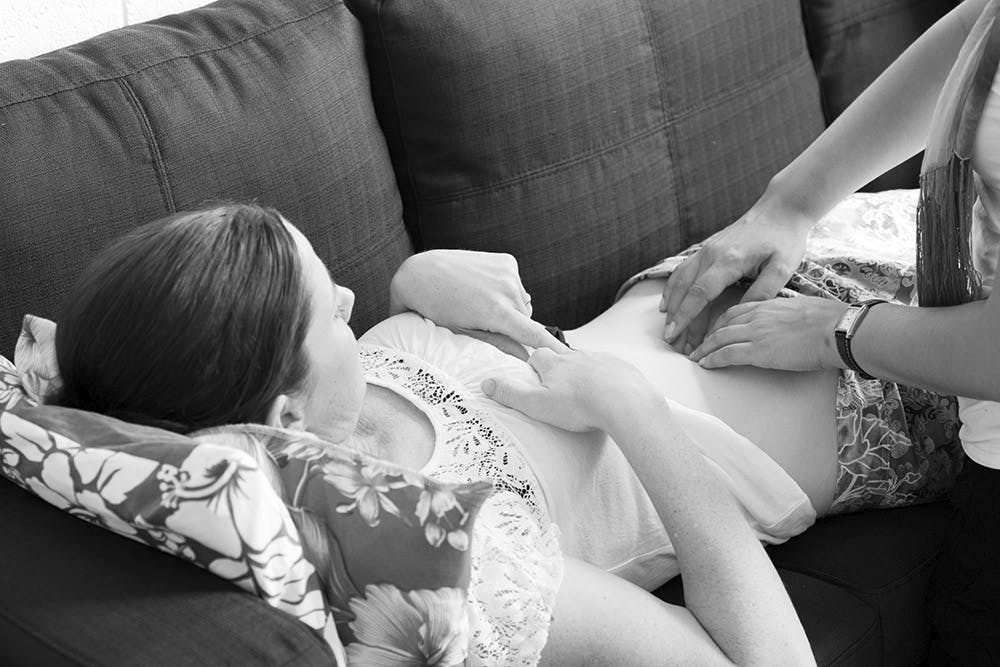Why am I experiencing these problems? Is it normal?
During pregnancy, labor, and delivery, whether vaginal or Cesarean birth, significant musculoskeletal changes occur in the woman’s body that may greatly affect her daily life. This is true regardless of the medical complexity of the pregnancy and the method of delivery. These postpartum changes may impact a new mother’s ability to care for her child, enjoy sexual intercourse, participate in exercise, work, and her ability to simply feel well.
Throughout a woman's childbearing years, especially during the prenatal and postpartum periods, it is common but not normal to experience back, tailbone, hip, scar or pelvic pain, to leak urine, to experience bowel dysfunction, or to have separation of the abdominal wall muscles, known as diastasis recti. Normal hormonal changes during pregnancy cause ligaments and muscles to stretch to prepare the body for delivery. These changes contribute to laxity of the pelvic girdle leading to spine, hip and groin pain, pelvic organ prolapse and bladder and bowel issues. Flattening of the arches in the woman’s feet is another consequence of tissue laxity. Many women wrongly assume their feet grew during pregnancy, when actually they only appear longer due to the dropping of their longitudinal arch. Fallen arches appear to be a benign problem, however, this simple postural change can be the culprit of knee, hip and spine pain.
Although these conditions are common in pregnancy and postpartum they should be treated promptly, as they respond more quickly if treated early on and they often do not correct themselves. In fact, ignoring these problems can result in chronic functional and quality of life issues. Proactively addressing potential postpartum issues allows for a more speedy recovery and smooth return to lifting your baby, exercising, returning to work and enjoying physical intimacy.
Did you know?
- An International Journal of Obstetrics and Gynaecology found that among women who reported having urinary incontinence at 3 months postpartum, 76.4% reported still having it at 12 years.
- 60% of postpartum women have a separation of their abdominal muscles, (diastasis recti) and 39% continue with abdominal issues 6 months later.
- 24% of women have painful sex 18 months after giving birth.
- 30% of women who have untreated pelvic pain during pregnancy later become chronic pelvic pain patients.
- 50% of all women have pelvic organ prolapse.
What is involved in a physical therapy postpartum check-up?

A postpartum physical therapy checkup is a comprehensive evaluation performed by a women’s health pelvic floor physical therapist specialist.
The checkup will include:
- Detailed medical history including pre-pregnancy, pregnancy, labor and delivery.
- Review of current symptoms/concerns/goals.
- Extensive review of related anatomy and patient education.
- Assessment of patient’s posture, pelvic alignment, full body and trunk strength and mobility evaluation.
- Pelvic floor evaluation: Including internal examination if consented by patient/MD in order to examine for prolapse, pain, muscle tone, weakness and coordination.
- Abdominal muscle assessment: examining core strength and test for an abdominal separation, known as a diastasis recti.
- Assessment of episiotomy or cesarean scars.
- Examination of breathing patterns.
- In cases of constipation and urinary incontinence: assessment of diet, bladder irritants and hydration.
Following your PT checkup, your therapist will recommend one of the following:
- Physical therapy treatment in the clinic.
- Physical therapy treatment in the convenience of your home.
- Physical therapy treatment in your home with a PT delivering services remotely via a telehealth video session.
- Referral to a specialist.
- A tailored home exercise program.
- The most appropriate exercise class for your current status.

If needed, Physical Treatments may include:
- Hands-on manual therapy to improve tissue quality and adhesions around c-section or episiotomy scar.
- Neuromuscular re-education exercise techniques to facilitate stability in the spine, pelvic girdle, pelvic floor and abdominal muscles.
- Diastasis recti correction exercises.
- Joint mobilization to restrictions found in joints of the spine or extremities.
- Training in optimal body mechanics for nursing, bathing, lifting and carrying your baby and heavy baby gear.
- Supervised progression to return to running, exercise classes, lifting, or other fitness pursuits.
Every mother benefits from a postpartum check-up. Seeing a physical therapist for a check up allows the new mother the peace of mind that comes with knowing whether what she is experiencing is normal or not. If further intervention is required, appropriate care will be initiated without delay, reducing unnecessary suffering and decreasing the possibility of developing chronic pelvic issues. Our skilled physical therapy pregnancy and postpartum team offers an evidence-based musculoskeletal assessment for women seeking to start off their postpartum period on the right foot. Although it is best to treat areas of concern early on, it is never too late.
Call now and schedule your evaluation today!
